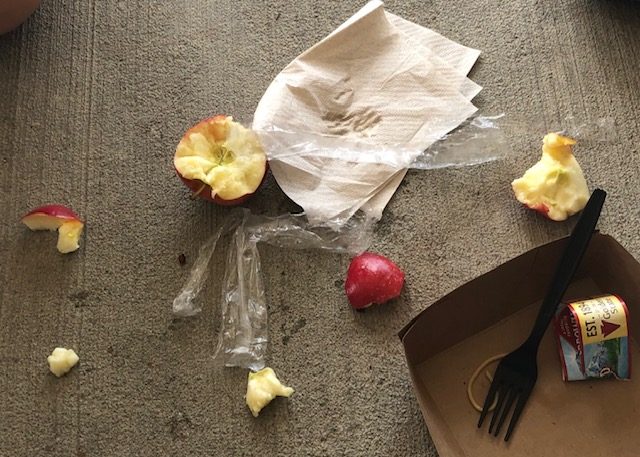Go Green!
September 27, 2019
Sweltering summers, hazy air, and dull ocean reefs await the world due to nearly irreversible levels of climate change, pollution, and habitat loss. According to a report released by the UN Intergovernmental Panel on Climate Change (IPCC), only twelve years remain to keep global warming to a maximum of 1.5℃, beyond which “even half a degree will significantly worsen the risks of drought, floods, extreme heat and poverty for hundreds of millions of people,” according to the Guardian.
Scientists warn that failing to reverse this climate change will result in extreme weather, including heat waves and forest fires, as well as the loss of habitat for insects. It will also threaten ecosystems, heighten the risk for large scale singular events, reduce coral, limit crop yields, cause coastal flooding, and increase river flooding, according to the IPCC report.
Rates of climate change as well as other environmental concerns including air pollution, marine pollution, and habitat loss have accelerated beyond their natural progression as a result of human activity. Overuse of plastic, unsustainable energy sources, and water waste contribute to the concerning declining state of the environment.
With increasing environmental concern, it is becoming more important to promote conservatism to the next generation, who can only take proper action if they are properly aware. It is essential that schools encourage the development of conscious students.
YLHS is one of many schools taking steps to encourage such development on campus. For example, recycling is strongly upheld at YLHS. Recycling bins can be found in classrooms and around campus, providing students and faculty an alternative to throwing away paper, cans, and plastic bottles. Fortunately, overall use of plastic water bottles has decreased with the installment of multiple water refill stations. In addition to access to chilled and filtered water, the combined refill stations across campus have saved hundreds of thousands of plastic bottles.
Our most recent environmental measure was the shift to an LED lighting system. Prior to LEDs, YLHS used incandescent bulbs; in comparison, LEDs are six times cheaper, five times more energy efficient, and last twenty-five times longer than incandescent lighting. It is also becoming standard for schools to include elements of technology in their educational system. At YLHS, Chrome books are available in nearly every classroom, reducing paper and other resources.
YLHS’s efforts contribute toward the movement of conservation and environmental awareness. At the individual level, YLHS students are also making efforts to be more environmentally friendly:
Does any part of your electricity at home come from renewable sources?
Melanie Henderson (9) – I use solar panels to heat up my pool.
Megan Chou (9) – The electricity in my house comes from the solar panels on my roof.
Audrey Do (9) – Yes, we have solar panels.
How often do you recycle?
Chou – In my household, we recycle daily.
Sophie Zhang (10) – My family recycles plastic water bottles daily.
Do – Maybe once or twice a month.
Elaine Thio (9) – I recycle quite often. I also make sure to take the lids off of cans and bottles so that when they go to the recycling plant, they’re able to air dry.
Do you drink bottled water, or do you have a refillable bottle?
Henderson – I drink bottled water more often.
Chou – I drink from a metal refillable water bottle.
What do you do to help the environment?
Henderson – To help the environment, I have done several cleaning activities with my Girl Scouts, such as picking up trash in a park.
Chou – To help the environment, I clean after myself instead of leaving trash.
Zhang – Besides recycling, we try to conserve as much water as possible and wash dishes by hand.
Do – Recycle and I also try to use less plastic products.
Thio – I don’t litter and never plan on doing it. I also use reusable grocery bags when I go to the supermarket and fill a steel water bottle everyday to cut back on plastic waste.
Do you think YLHS does a good job at keeping the campus environmentally friendly?
Zhang – I don’t see trash that much at our school so I think they do a good job keeping it environmentally friendly.
Do – Yes.
Thio – I do think that the school is eco friendly because it has recycling bins to put empty water bottles and other plastic in.
Being kind to the planet can be as easy as you make it. Building habits to recycle more or decrease pollution can make big differences. A few easy environment conservation steps can be as simple as bringing reusable beverage containers, biking instead of driving, using less fertilizers, or decreasing meat consumption.
On the topic of decreasing meat consumption, a UN report states, “Cattle-rearing generates more global warming greenhouse gases, as measured in CO2 equivalent, than transportation.” People all over the world use cars for transportation. Every day, thousands of cars are emitting gases, and yet cattle-rearing is an even larger pollutant. So, consume less meat and exercise by walking or biking to school and/or work. Doing so eliminates two of the largest polluting factors and benefits your health.
Wild life is being effected by pollution as well. The world’s addiction to constantly polluting the environment with plastic bottles will have devastating effects on the planet. “A million plastic bottles are bought around the world every minute and the number will jump another 20% by 2021, creating an environmental crisis,” as stated by the Guardian. Preventing pollution by using reusable water bottles will better wild life health and weather conditions.
The environment is in a fragile state, but with efforts from schools and individuals to go green, the planet can still be saved.






































